 'Model husband' shatters image of love
'Model husband' shatters image of love
 Can animals smile? Or put on a happy face
Can animals smile? Or put on a happy face
 Geng Xuan crowned at 9th China Super Model Contest
Geng Xuan crowned at 9th China Super Model Contest
 Top 10 billionaires in the liquor industry
Top 10 billionaires in the liquor industry
 Backstage at China Fashion Week
Backstage at China Fashion Week
 Ballerinas anywhere but onstage
Ballerinas anywhere but onstage
 Top 10 safest airlines in the world
Top 10 safest airlines in the world
 Posters of 33rd HK Film Awards unveiled
Posters of 33rd HK Film Awards unveiled
 Top 10 most popular instant messaging apps in the world
Top 10 most popular instant messaging apps in the world
 Inspiring shadow images of Chinese army
Inspiring shadow images of Chinese army
Chinese President Xi Jinping has just returned to Beijing after wrapping up his 11-day, four-nation tour to Europe. It was the president’s first trip to Europe since taking office last year. He started his trip on March 22nd in the Netherlands, spent 4 days there and then moved on to France. Two days later, he continued to Germany before concluding his tour in Belgium. It was a busy trip for Xi, who met with European leaders, delivered keynote speeches and witnessed the signing of business contracts.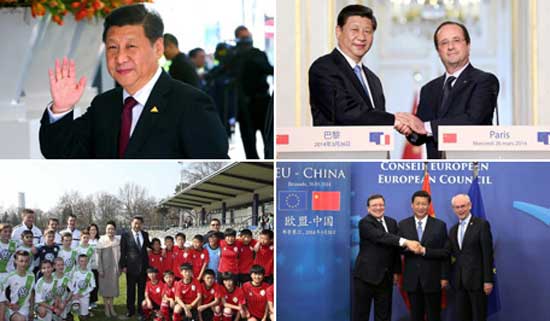
Chinese president visits four nations in 11 days.
President Xi began his tour in the Netherlands, becoming the first Chinese head of state to visit the country since the two sides established diplomatic relations in 1972.
In a meeting with Dutch Prime Minister Mark Rutte, the two countries agreed to build a comprehensive partnership that stresses openness and pragmatism.
The highlight of Xi’s stay in the Netherlands came in The Hague, where he attended the Third Nuclear Security Summit. He called on global cooperation on nuclear security, stressing that it was just as important as the development of nuclear energy.
He then moved on to France to meet president Francois Hollande, on the two countries’ 50th anniversary of bilateral ties. At the UNESCO headquarters in Paris, President Xi spoke at length about the importance of peace and diversity of culture. He even took the opportunity to explain the Chinese Dream.
"The Chinese people are working hard towards achieving the Chinese Dream of the great rejuvenation of the Chinese nation. That means we will achieve national prosperity, the people’s rejuvenation, and the people’s happiness. It conveys the ideal of today’s China, and reflects the Chinese people’s tradition of pursuing improvement since ancient times." Xi said.
Meanwhile, the Chinese first lady Peng Liyuan, also a good will ambassador for the World Health Organization, went solo on her own diplomatic mission, visiting a children’s hospital in Paris.
The third leg of Xi’s tour was Germany, where he met with President Joachim Gauck and Chancellor Angela Merkel. In another keynote speech, Xi hailed the achievements brought by improved China-Germany relations and spoke on China’s peaceful development.
"They portray China as some kind of monster that will someday suck the soul out of the world. This portrayal could not be more ridiculous, yet regrettably, some people never get tired of repeating it. It shows that prejudice is indeed hard to overcome." Xi said.
He mentioned China’s plans to quickly raise people’s living standards but noted that satisfying a population of 1.3 billion has its challenges.
Escorted by Belgian Royal Air Force planes, Xi came to his last stop in Belgium. In Brussels, he met with Prime Minister Elio Di Rupo and the Belgian King and Queen.
He later paid a visit to the headquarters of the European Union. Talks with EU officials included discussions on a bilateral investment treaty and strengthening the two sides’ comprehensive strategic partnership.
Speaking later at the College of Europe university in the northern city of Bruges, President Xi laid out ambitious goals for bilateral trade between China and the EU.
"China and EU are two of the most important economies in the world, with our combined economies accounting for one third of the global economy. We must uphold open markets, speed up negotiations on investment agreements, actively explore the possibility of a free trade area, and strive to achieve the ambitious goal of bringing two way trade to a trillion US dollars by 2020." Xi said.
Politics aside, business was another focus on Xi’s European tour. A number of business deals were signed, including an order for 70 planes worth over 10 billion euros with France’s Airbus, and a one-billion euro deal for the German car company Daimler to expand its presence in China.
 Wonderful moment of China's airborne forces
Wonderful moment of China's airborne forces Bai Baihe shoots for fashion magazine
Bai Baihe shoots for fashion magazine Red terraced fields in Dongchuan of Yunnan
Red terraced fields in Dongchuan of Yunnan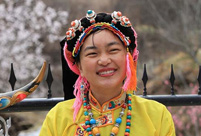 Jiaju Tibetan Village
Jiaju Tibetan Village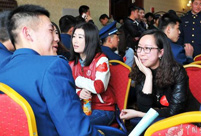 Spring dating
Spring dating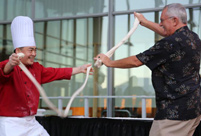 Confucius institute at UC Davis
Confucius institute at UC Davis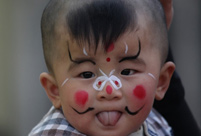 Little painted faces at temple fair
Little painted faces at temple fair Top 10 safest airlines in the world
Top 10 safest airlines in the world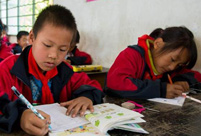 Foreign students at China-Myanmar border
Foreign students at China-Myanmar border The backstage of the Fashion Week
The backstage of the Fashion Week College students in Han costumes
College students in Han costumes Postgraduate works as waitress
Postgraduate works as waitress Life in a Lahu village in Yunnan
Life in a Lahu village in Yunnan An orphan’s wedding
An orphan’s wedding Hollywood documentary brings Diaoyu Islands truth to new audience
Hollywood documentary brings Diaoyu Islands truth to new audienceDay|Week|Month